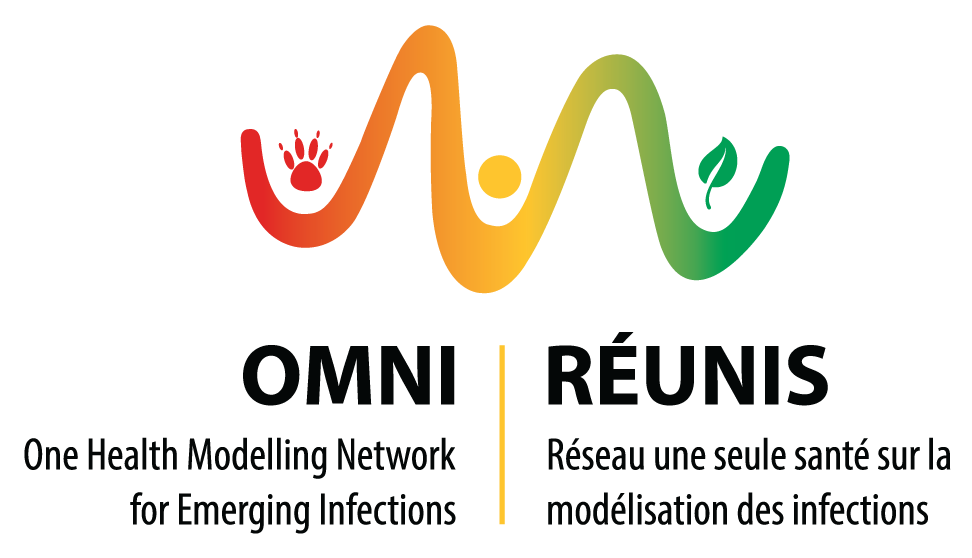|
![]()
| OMNI – People Person1 #679714 Our English and French acronyms of the network, One Health Modelling Network for Emerging Infections (OMNI)/RÉseau UNe seule santé sur la modélisation des InfectionS (RÉUNIS) symbolize universality and the bringing together of people and ideas. This is precisely what we have done, having amassed an amazing network of interdisciplinary people with a commitment to a One Health approach to stopping emerging infectious diseases (EIDs) at all levels. | 
MissionThe One Health Modelling Network for Emerging Infections (OMNI) is a newly established network born out of the COVID-19 pandemic. Our mission is to build a modelling network that will enhance Canada’s early detection, warning, and response to emerging infectious diseases by systematically incorporating a multi-species, multi-system One Health approach into our thinking, modelling research and training capacity while also recognizing the unique impact emerging infectious diseases has on Indigenous peoples and their communities. VisionOMNI’s vision is to ensure that our enhanced modelling capacity and interdisciplinary research collaborations fostered by our network will lead to rigorous science-informed policy decision-making, during and after the COVID-19 pandemic. To be achieved through One Health-enhanced infectious disease modelling expertise and capacity building of highly qualified field experts, and effective Knowledge Transfer (KT) strategies across global and national academic and public spaces. Research ProjectsTheme 1: Data Management Theme 2: Risk for Emergence and Spillovers Theme 3: Early Warning Systems of Emerging Infectious Diseases Theme 4: Intervention and Control Theme 5: Indigenous Peoples Health & Wellbeing Funding Funded by the Natural Sciences and Engineering Research Council of Canada (NSERC) and Public Health Agency of Canada (PHAC), OMNI-RÉUNIS is part of the broader Emerging Infectious Diseases Modelling Initiative (EIDM) Consortium. Our network plays a unique role as the lead in directly incorporating a One Health approach by using multidisciplinary knowledge about the connections between environmental, animal and human health to refine the disease modelling that is used to identify pathogens early. Geography OMNI-RÉUNIS is geographically broad, with Co-Applicants from 10 provinces from coast to coast from 23 academic institutions and collaborators from 28+ national and international organizations. Their expertise ranges from public health, infectious diseases, and epidemiology, to human health, animal health and wildlife, as well as climate-related health outcomes. Network Our English and French acronyms of the network, One Health Modelling Network for Emerging Infections (OMNI)/RÉseau UNe seule santé sur la modélisation des InfectionS (RÉUNIS) symbolize universality and the bringing together of people and ideas. This is precisely what we have done, having amassed an amazing network of interdisciplinary people with a commitment to a One Health approach to stopping emerging infectious diseases (EIDs) at all levels. Tags: OMNI Network |
+Αναφορές (1) - ΑναφορέςΠροσθήκη αναφοράςList by: CiterankMapLink[1] NSERC Funding Decisions: Emerging Infectious Diseases Modelling Initiative
Συγγραφέας: NSERC
Παρατέθηκε από: David Price 11:23 AM 7 June 2021 GMT
Citerank: (9) 679703EIDM?The Emerging Infectious Diseases Modelling Initiative (EIDM) – by the Public Health Agency of Canada and NSERC – aims to establish multi-disciplinary network(s) of specialists across the country in modelling infectious diseases to be applied to public needs associated with emerging infectious diseases and pandemics such as COVID-19. [1]7F1CEB7, 679712CANMOD – PeopleCANMOD is a national network, with members located across the country and associated with a broader Emerging Infectious Disease Modelling (EIDM) initiative. We are a community of modellers, statisticians, epidemiologists, public health decision-makers, and those implementing and delivering interventions.10019D3ABAB, 679715OSN – PeopleThe One Society Network (OSN), led by Dr. Christopher McCabe at the University of Alberta, will include developing modelling for evaluating alternative policy responses during pandemics for all sectors of the economy and aspects of society, including marginalised groups. They will also be collaborating on multi-disciplinary training programs for skills development to support public policy making in future pandemics. [1]10019D3ABAB, 679716SMMEID – PeopleStatistical Methods for Managing Emerging Infectious Diseases (SMMEID), led by Dr. Patrick Brown at the University of Toronto, will develop methods and tools to get an accurate picture of the nature and extent of infectious disease transmission in the population, relying on real-world data from administrative sources and surveys. They are seeking to augment Canada's capacity to respond to emerging infectious diseases. [1]10019D3ABAB, 701002OMNIThe One Health Modelling Network for Emerging Infections (OMNI), led by Dr. Huaiping Zhu at York University, will identify gaps that can be used to prioritize more targeted surveillance or data collection and then use those data to refine models. This work will contribute to an improved understanding of the conditions that enable pathogen spread and transmission and identify actions that can most effectively manage these conditions. [1]1002079B9B9, 701005CANMOD?CANadian Network for MODelling infectious Disease / Réseau CANadien de MODélisation des maladies infectieuses1002079B9B9, 701006MfPHMathematics for Public Health (MfPH), led by Dr. V. Kumar Murty, Director of the Fields Institute and Professor at the University of Toronto, will aim to bridge the gap between mathematical research and real public health issues. The team will seek to produce models that are effective, practical and reliable for applications to public health issues for COVID-19 as well as boost Canada’s future pandemic preparedness. [1]1002079B9B9, 701007OSNThe One Society Network (OSN), led by Dr. Christopher McCabe at the University of Alberta, will include developing modelling for evaluating alternative policy responses during pandemics for all sectors of the economy and aspects of society, including marginalised groups. They will also be collaborating on multi-disciplinary training programs for skills development to support public policy making in future pandemics. [1]1002079B9B9, 701008SMMEIDThis project assembles the top biostatisticians in Canada working on infectious diseases, and joins them with epidemiologists developing novel methods for data collection during the COVID-19 pandemic. Our group is developing methods and tools to get an accurate picture of the nature and extent of infectious disease transmission in the population, relying on real-world data from administrative sources and surveys. [2]1002079B9B9 URL:
|
|
|